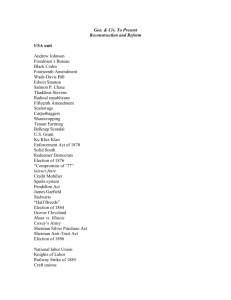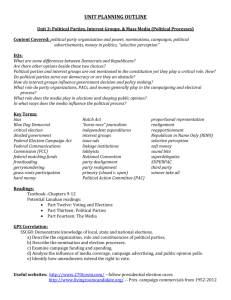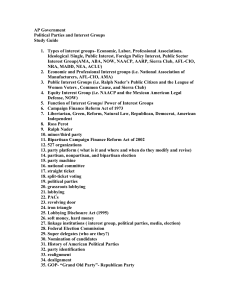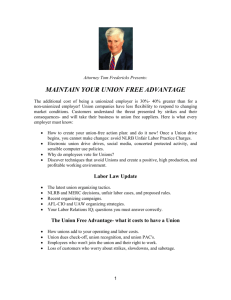a Sample Comment - Labor Relations Institute
advertisement
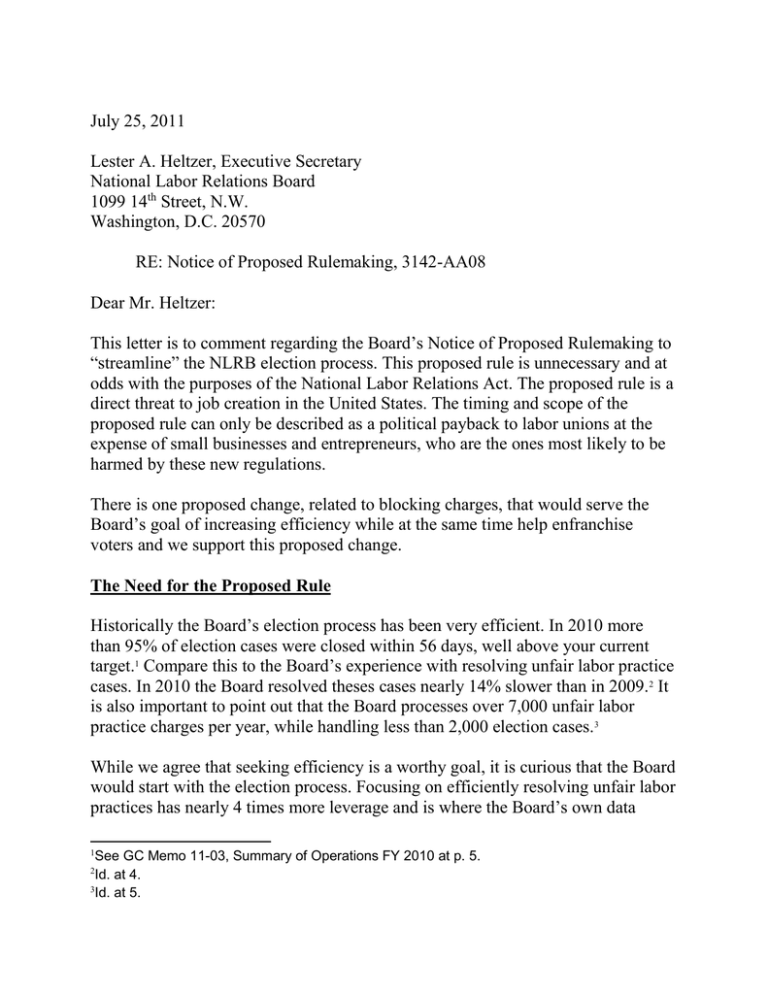
July 25, 2011 Lester A. Heltzer, Executive Secretary National Labor Relations Board 1099 14th Street, N.W. Washington, D.C. 20570 RE: Notice of Proposed Rulemaking, 3142-AA08 Dear Mr. Heltzer: This letter is to comment regarding the Board’s Notice of Proposed Rulemaking to “streamline” the NLRB election process. This proposed rule is unnecessary and at odds with the purposes of the National Labor Relations Act. The proposed rule is a direct threat to job creation in the United States. The timing and scope of the proposed rule can only be described as a political payback to labor unions at the expense of small businesses and entrepreneurs, who are the ones most likely to be harmed by these new regulations. There is one proposed change, related to blocking charges, that would serve the Board’s goal of increasing efficiency while at the same time help enfranchise voters and we support this proposed change. The Need for the Proposed Rule Historically the Board’s election process has been very efficient. In 2010 more than 95% of election cases were closed within 56 days, well above your current target.1 Compare this to the Board’s experience with resolving unfair labor practice cases. In 2010 the Board resolved theses cases nearly 14% slower than in 2009.2 It is also important to point out that the Board processes over 7,000 unfair labor practice charges per year, while handling less than 2,000 election cases.3 While we agree that seeking efficiency is a worthy goal, it is curious that the Board would start with the election process. Focusing on efficiently resolving unfair labor practices has nearly 4 times more leverage and is where the Board’s own data 1 See GC Memo 11-03, Summary of Operations FY 2010 at p. 5. Id. at 4. 3 Id. at 5. 2 shows they are moving the wrong direction. Instead the Board is focusing its limited agency resources on the election process, where targets are being met and exceeded. The Substance of the Proposed Rule The proposed rule seeks special comment on electronic signatures and blocking charges. Allowing electronic signatures is a terrible idea. There are plenty of examples of situations where employees were tricked into signing a physical authorization card by being told it was something else. The likelihood of confusion and even abuse is much greater with electronic signatures. Checking a box on a website is done as an afterthought today. Ask yourself: When was the last time you actually read the software license before you updated Microsoft Word? Nonlawyer employees are even less likely to “read the fine print” before checking a box on a union website. Reforming the process around “blocking” charges is an excellent idea. The current process is abused and frustrates and disenfranchises voters. In 2010 less than 5% of elections required a Board resolution of objections.4 Casting the ballots, even if they are impounded, is far superior to delaying the election on the off chance that a charge might have enough merit to warrant other actions. Fast-tracking the investigation and resolution of the blocking charge is also a great idea - as discussed above, this should be the focus of any Board rulemaking if the true goal is to improve efficiency of the process. Next I’d like to address the aggressive time targets in the proposed rulemaking. The Board proposal wants all pre-election unit issues resolved within 5 business days, or else hold a hearing to resolve them. It will be nearly impossible for small employers – many of whom will first have to find experienced legal counsel aggressive time-frame proposed. These proposed time targets are so aggressive that they will lead to mistakes, poor judgments, and are likely to complicate rather than simplify unit issues. Some may argue that the Board’s exception for “special circumstances” can cover a situation where a small employer must find counsel. This depends on how the various regions interpret the exception. But if things like finding counsel are considered “special circumstances” then the exception will swallow the rule and virtually all cases will likely be delayed. The efficiency gains sought are unlikely 4 See General Counsel Memo GC 11-03 at p. 5. Page 2 of 5 to occur. More likely, you will have regions make inconsistent application of the exception, often to the detriment of small businesses. Instead the Board should give companies ample time to hire counsel and thoroughly assess their situation, especially given the severe penalty for failing to do so under the proposed rule. The requirement to furnish a list of voters, including phone numbers and email addresses, in two days after the direction of election is simply not enough time. Most small companies do not have a centralized human resource system and was spread out among many states. Even if they do there are often signification questions about who is in and out of the unit (and therefore should be on the list in the first place). Whether talking about a small organization or even a big company, it can often take more than a day just to get a list to review. Getting this list right is too important to rush. If it’s wrong it can overturn the election. The current seven days is a good balance between getting the list quick and getting it right. The Board also asks for comment on penalties for improper disclosure of confidential information. The Board should provide some type of opt-out process for employees who wish to protect their private contact information from unions and other allied groups. In addition, there should be severe penalties for breaches of these confidentiality provisions. The core change in the proposed rulemaking is shifting many of the appropriate unit decisions until after the election. The biggest change is punting any unit issues affecting less than 20% of the unit until after the election. The vast majority of elections today occur around a month after the petition is filed, even while deciding all unit issues in advance. Pushing the hearing until after the election creates uncertainty with voters, disenfranchising both union and company supporters. It is common that a petition might include both production and maintenance employees. But sometimes employees from one department may not want to be included with the other. The purpose of the current framework is to make sure that employees who share a community of interest are included in a unit together - and that they are excluded from employees who don’t share a community of interest. Some employees may decide not to vote because they don’t want to be included with others who may or may not be in the final unit. Workers have the right to know who will be in their bargaining unit on the day they vote. If you are Page 3 of 5 interested in enfranchising workers then make sure they know exactly who will be in their bargaining unit when they vote. Furthermore, the challenge process creates a situation to where some votes may not be anonymous. Under the current rule the number of challenged ballots is usually limited. Under the proposed rule you will have many more potential challenged ballots. Each of those voters may be concerned that their vote might be disclosed. For this reason it is important for as many potential challenges to be resolved prior to the actual vote. Why Elections Should Not Be Shortened The employer right to free speech, protected by the First Amendment and codified in Section 8(c) of the Act, gives companies the right to state their opinions about unions to their employees. The purpose of shrinking the period from petition to election is to so severely limit the amount of time and employer has to communicate to employees about unions that it effectively destroys the right completely. Unions today often campaign for months before an employer is even aware that employees are being approached to sign union authorization cards. Often the first notice an employer has of union organizing is the notification from the NLRB that a petition has been filed. It is clear that the tactic of “underground” campaigns is pervasive and specifically intended to prevent employers from exercising their free speech rights under the Act. There is little evidence that the exercise of the employer free speech right harms unions at all. For example, unions win nearly 70% of all union elections under the current rules. Unions sometimes counter this by arguing that they withdrawing more petitions than they used to. This claim, repeated by Member Becker during the open meeting, is supposed to reinforce the narrative by unions that anti-union company campaigns are getting worse and to blame for the significant decrease in private sector unionization. The problem with the claim is that it is patently untrue. While unions do withdraw petitions each year, this withdrawal rate has remained relatively consistent over the last decade (if anything it is dropping), even while the union win rate has improved substantially. In fact, in 2010 unions won 67% of elections while withdrawing only 26% of petitions, the lowest number on record. Page 4 of 5 Ironically, the proposed rulemaking is likely to increase unlawful employer conduct. This is because employers, particularly small employers who will be hurt most by the proposed rule, are intentionally thrust into a complex legal situation under extreme time pressure. Unfortunately smaller and unsophisticated employers, without the benefit of expert legal counsel or consultants well-versed in the rules (not to mention a calming influence in these tense cases), are likely to engage in knee-jerk, emotional behavior that is likely to further complicate and slow down the process. There is very little to be gained, and much lost, in rushing certification cases through. The current system balances quick resolution of questions concerning representation with thoughtful resolution of them. Conclusion The proposed rule is unnecessary and ironically discourages participation in elections. Increasing efficiency is a worthy goal. But these changes seem designed for the sole purpose of reducing the time to election. Pushing most unit decisions until after the election disenfranchises voters and is counter to the purposes of the Act. Any rule change needs to be about what is best for workers, not what is best for unions. The proposed rule is counter to the purposes of the Act and impairs the credibility of the Board at a time when it is seen increasingly as a politicized agency determined to help labor unions. The bottom line is that the Board should not implement the dramatic changes proposed. Page 5 of 5
